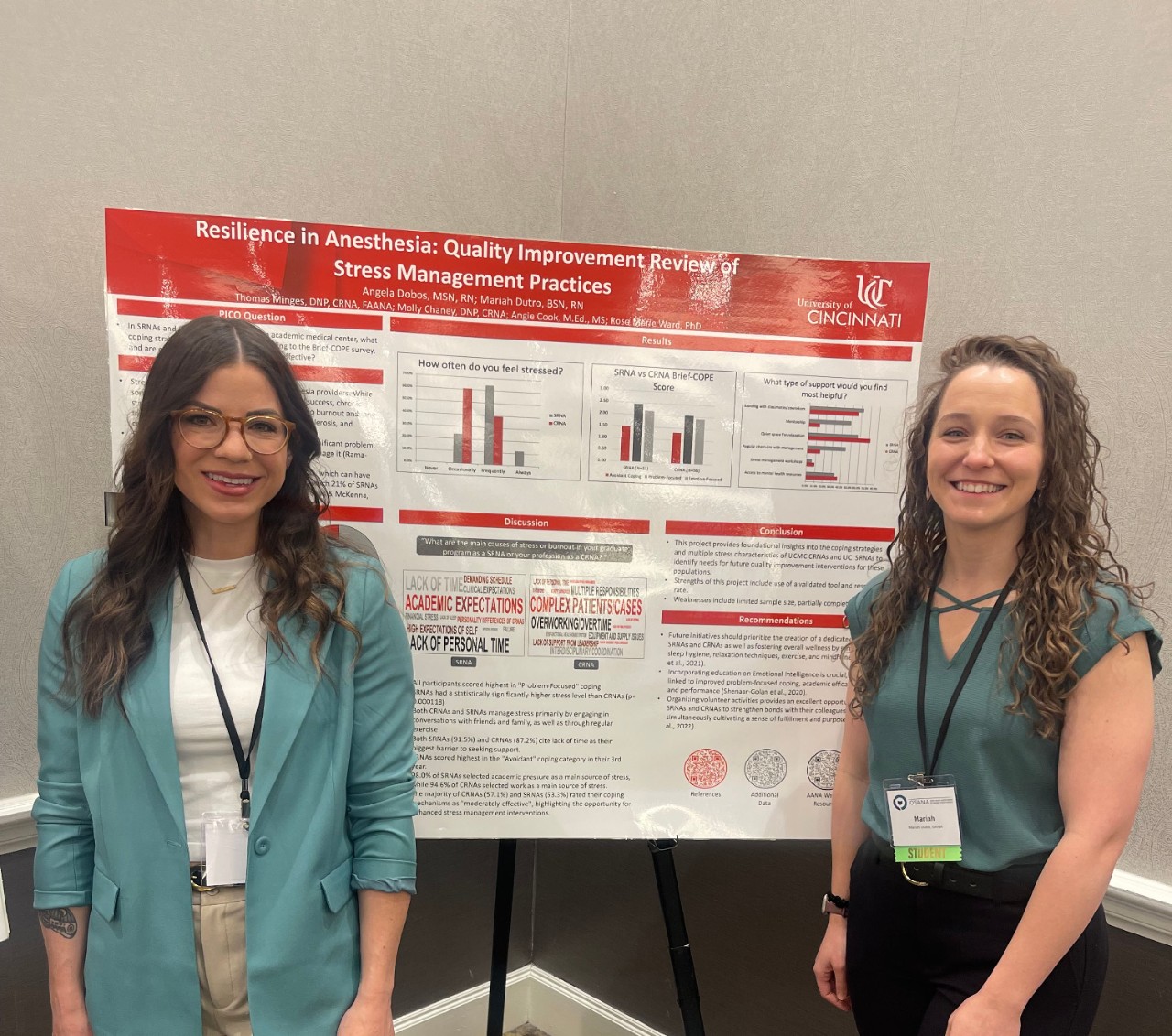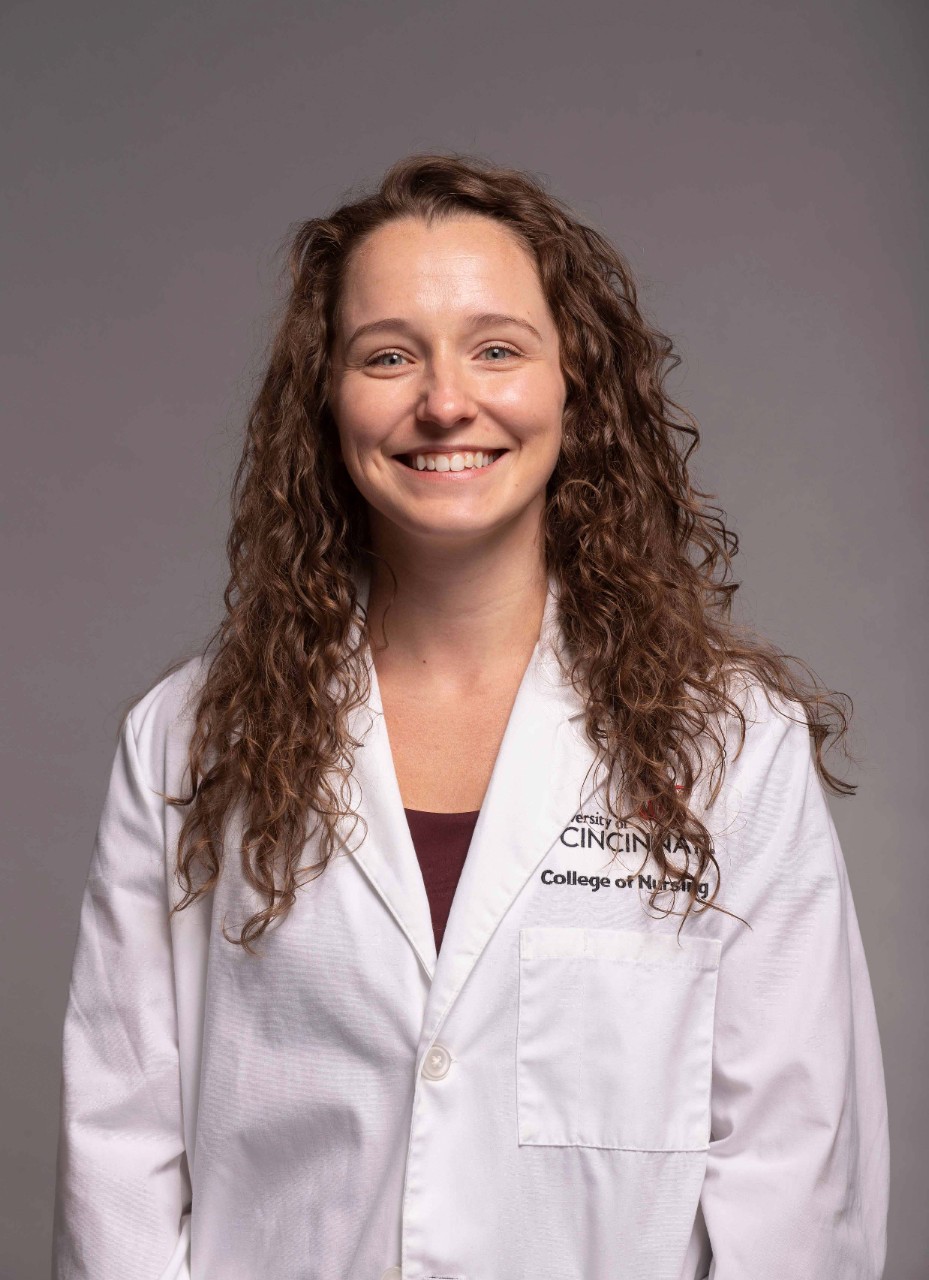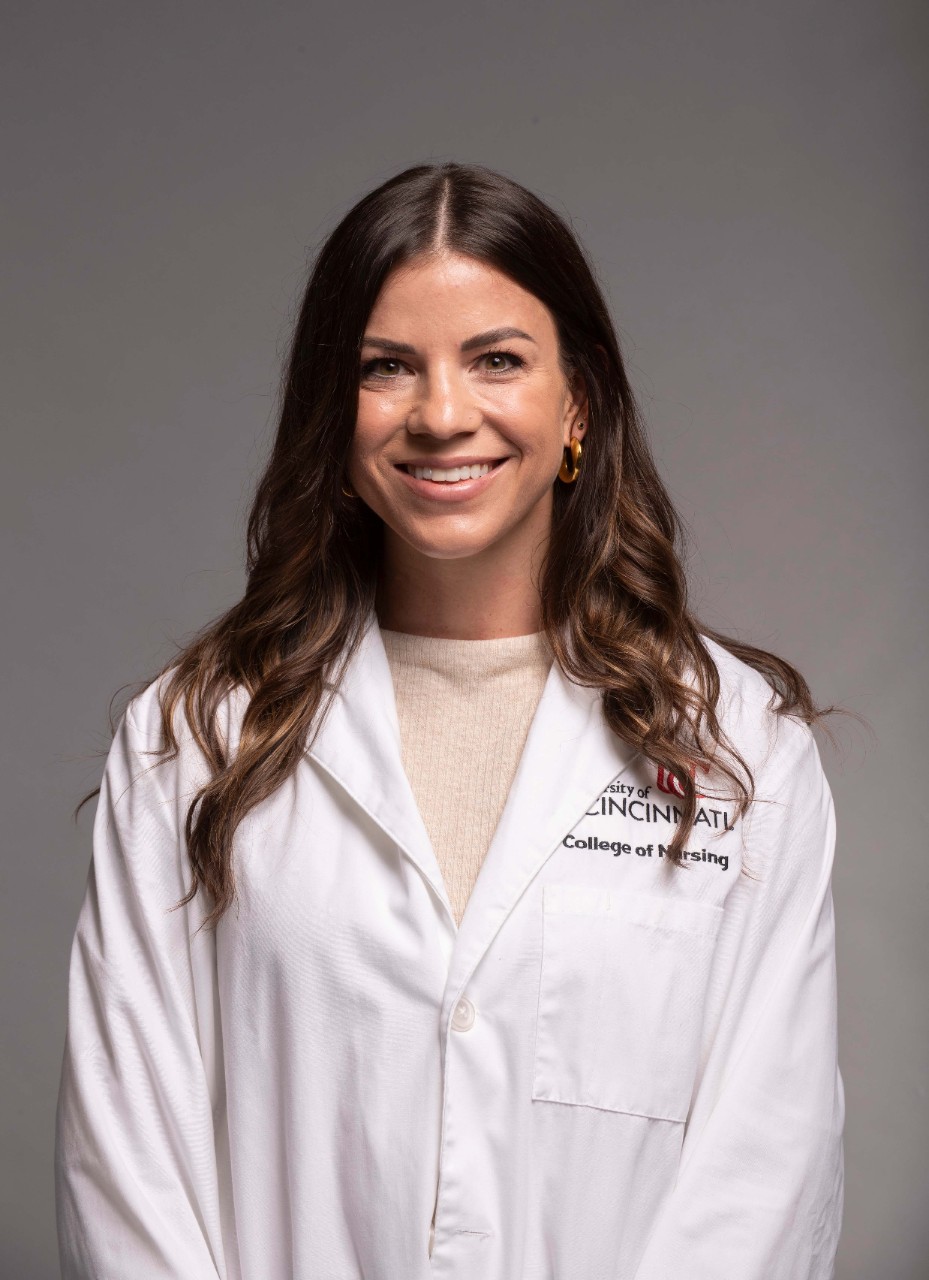
UC students destigmatize stress in nursing
Research highlights addiction risks and stress relief solutions
For many entering the world of nursing, stress is a part of the job description.
But two determined nursing students at the University of Cincinnati are seeking to loosen stress’s vice grip on the profession, challenge the stigma and introduce a holistic approach to navigating stress in the nursing world.
Third-year College of Nursing student Angela Dobos and second-year student Mariah Dutro are in UC's Nurse Anesthesia Doctor of Nursing Practice program. They co-led a quality improvement project titled Resilience in Anesthesia: Quality Improvement Review of Stress Management Practices, which they presented at the Ohio State Association of Nurse Anesthetists conference.
The project assessed the effectiveness of existing stress management practices and explored evidence-based solutions for addressing chronic stress and burnout among student registered nurse anesthetists and certified registered nurse anesthetists. Their study gathered survey responses from students and nurses at UC and UC Medical Center. They classified participants into three distinct coping styles: problem-focused, emotion-focused and avoidant coping.
Calls to action
Dobos and Dutro bring personal perspective into their research project and have both experienced the pitfalls of high levels of stress leading to unhealthy coping strategies within their families.
“One in 10 CRNAs have an addiction issue. Substance abuse is very prevalent in our field of work, more prevalent than the average American job,” said Dobos, an intensive care unit ICU nurse of seven years.
“It’s a big deal to me to promote healthy coping mechanisms, because drug addiction, while a disorder, can also come from stress. I lost a brother to an overdose, so I feel strongly about helping people find other outlets for their stress.”
Dutro, a former ICU and travel nurse, said her family history with addiction was a motivating factor.
“I wanted to ensure I knew how to care for my own mental health and help support others,” said Dutro.
“I have seen others go through the struggle with substance abuse. I myself have struggled with anxiety and depression, so when presented with the opportunity to research mental health, I thought it would be a good project to try to promote good adaptive coping mechanisms.
“Our project really emphasized how important it is to manage stress proactively.”
Stressful Results
Their findings painted a striking picture: while 98% of SRNAs cited academic pressure as a main source of their stress, 94.6% cited work as a main source of stress—indicating that stress, regardless of source, persists after graduation and into the workforce. Most notably, both groups cited a lack of time as their biggest barriers to seeking support or adopting new coping strategies.
While stress levels were statistically higher among SRNAs, CRNAs were far from immune. Dobos and Dutro observed that CRNAs still face significant pressure to work overtime, pay off student loans, and maintain performance in high-stakes environments. “The stress doesn’t go away after school,” Dutro said. “You have to build those habits now.”
“We have the [stress management] resources available to us that aren’t used. People usually say they don’t have the time, so we’re just trying to find simple ways to impact stress and mitigate an obvious issue in our profession”, said Dobos.
Despite academic and professional pressures, more than half of both groups rated their coping strategies as “moderately effective” (SRNAs 53.3%, CRNAs 57.1%).
“The [CRNA] program is very stressful. That is a fact. It wasn't a secret when we applied or when we started the program,” Dobos said. “But it's easy to fall into bad habits and [end up] pouring yourself into the program and your work, which can lead to [neglecting] other aspects of your life.”
Their project highlighted a broader cultural stigma within healthcare—where prioritizing mental health or self-care is often viewed as a weakness and discouraged. “In healthcare, we’re taught to always show up, always be strong. But recognizing that we also need support is a big deal,” said Dobos.
However, the stigma isn’t reserved for fellow nursing professionals. SRNAs typically have a challenging time communicating their stress and activities to non-specialist family members, often resulting in misunderstandings.
“The stress that we [SRNAs] deal with day-to-day, when we try to talk to family about it, they just don’t understand,” said Dutro.
Actionable recommendations
At the heart of their project are practical, actionable recommendations aimed at improving the mental well-being of both CRNAs and SRNAs. Key suggestions include establishing dedicated wellness spaces, integrating emotional intelligence (EI) education, and promoting time-efficient stress relief strategies like exercise, mindfulness, and peer connection.
"Mindfulness and camaraderie don’t take much time but have a big impact," Dobos said. “Spending time with fellow students outside of work, just having conversations, builds the kind of support that makes a real difference.”
The duo also emphasized the value of organizing volunteer activities and peer-led bonding events to cultivate a deeper sense of purpose and community belonging.
Part of the hope [of the project] is that we make [de-stressing] simple,” Dobos said. “A lot of the research shows that mindfulness and camaraderie—spending time with fellow students or coworkers outside of work—are important. It’s not necessarily about saying ‘I’m going to tackle my mental health.’ But when you’re bonding with others, building friendships and talking about stressors, you’re creating a support system that becomes a really simple outlet to manage stress.”
Dobos and Dutro emphasized that these strategies must be simple and easily woven into students’ busy clinical schedules. “We already have resources, but they go unused because people don’t feel like they have time,” Dobos noted.
When asked what intervention they would implement at UC immediately, both students recommended beginning class or clinical sessions with a short breathing exercise. “Take a deep breath, close your eyes, and do a five senses check-in,” Dutro said. “It may seem small, but it matters.”
Redefining resilience
The duo’s project not only provides insight into stress trends and coping behaviors, but it also opens the door for ongoing change in how nurse anesthesia professionals care for themselves and each other. For Dobos and Dutro, the work is about much more than data points—it's about shifting culture.
As summer approaches, the duo reflects on their project and personal understanding of what it means to persist in the face of adversity.
“Resilience is getting back up after you've been knocked down,” said Dutro.
“You are going to fail at things, especially in CRNA school. You just have to keep going and prove to yourself that you’re worth it. You can get through anything as long as you put your mind to it.”
Dobos added “Resilience is getting back up when you are challenged. Just facing challenges with an open heart and moving past things that are all temporary. Every little moment is a temporary moment. And if you can just get through it with an open mind and heart, you realize the bigger picture of life—that we're all just here to enjoy it and impact people in a positive way—that’s what resilience means to me.”

Mariah Dutro, second-year Doctor of Nursing Practice (DNP) student.
Dutro, a former ICU and travel nurse, cites her family history with addiction as a motivating pillar.
“[Knowing my predisposition] I wanted to ensure I knew how to care for my own mental health and help support others,” said Dutro.
“I have seen others go through the struggle with substance abuse. I myself have struggled with anxiety and depression, so when presented with the opportunity to research mental health, I thought it would be a good project to try to promote good adaptive coping mechanisms.”
“Our project really emphasized how important it is to manage stress proactively.”

Angela Dobos, third-year Doctor of Nursing Practice (DNP) student.
Dobos and Dutro bring personal perspective into their research project and have both experienced the pitfalls of high levels of stress leading to unhealthy coping strategies within their families.
“One in 10 CRNAs have an addiction issue. [Substance abuse] is very prevalent in our field of work, more prevalent than the average American job,” said Dobos, an intensive care unit (ICU) nurse of seven years.
“It’s a big deal to me to promote healthy coping mechanisms, because drug addiction, while a disorder, can also come from stress. I lost a brother to an overdose, so I feel strongly about helping people find other outlets for their stress.”
Featured image at to: UC College of Nursing students Angela Dobos and Mariah Dutro studied menatal health in nursing. Photo/Provided
Related Stories
From research to resume: Grad Career Week prepares students for career paths
February 20, 2026
Graduate students at the University of Cincinnati will explore how their academic and creative work translates into professional success during Grad Career Week, March 2–6, a week-long series of workshops, networking opportunities, and skill-building sessions hosted by the Graduate College.
Social media linked to student loneliness
February 20, 2026
Inside Higher Education highlighted a new study by the University of Cincinnati that found that college students across the country who spent more time on social media reported feeling more loneliness.
Blood Cancer Healing Center realizes vision of comprehensive care
February 19, 2026
With the opening of research laboratories and the UC Osher Wellness Suite and Learning Kitchen, the University of Cincinnati Cancer Center’s Blood Cancer Healing Center has brought its full mission to life as a comprehensive blood cancer hub.
